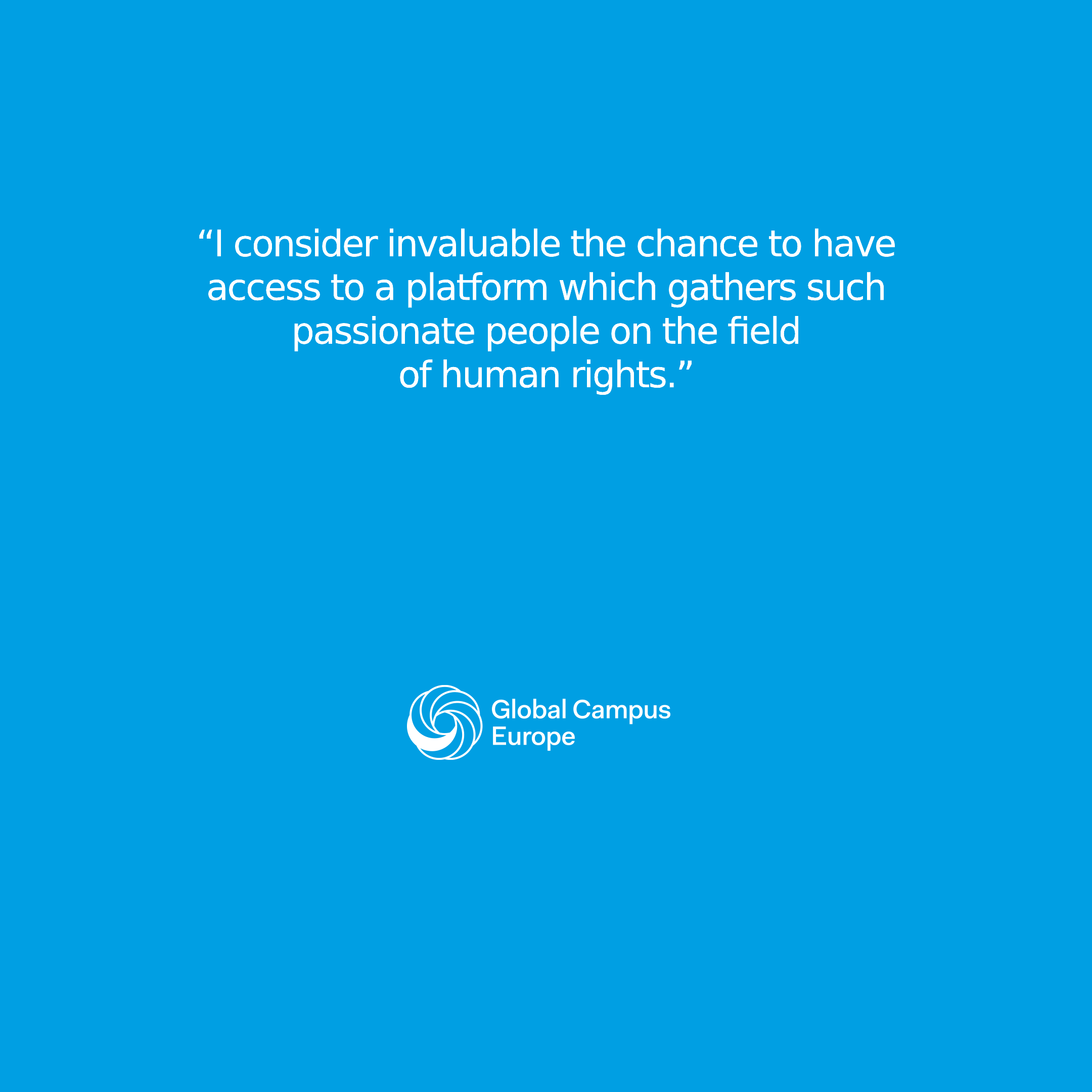EMA, The European Master’s Programme in Human Rights and Democratisation
The European Master’s Programme in Human Rights and Democratisation (ema) is a one-year course aimed at educating up to 100 professionals annually in the field of human rights and democratisation. It provides the foundation for a career in national, international, governmental, inter-governmental and non-governmental organisations, as well as academic institutions dealing with human rights and democratisation.
The Master’s Programme offers an action- and policy-oriented approach to learning that combines legal, political, historical, anthropological, and philosophical perspectives with skill-building activities and a field trip exercise.
ema is both a residential and an exchange programme. The first semester is organised at Global Campus Headquarters in Venice, while the second semester takes place in one of the 41 participating universities within the member states of the European Union.
Programme Details
Key Facts
| Start date | 16 September 2020 |
|---|---|
| Application deadlines | First Round Deadline: 3 February 2020 Second Round Deadline: 30 March 2020 Extended Deadline: 12 May 2020 |
| Duration | 12 months full-time |
| Tuition fee | €5500,00 (plus enrolment fee of €150,00) |
| Minimum entry requirement | University degree (minimum 180 ECTS credits) |
| English language requirements | Certified fluency in English |
| Location | 1st Semester (Sept.-Jan.): Global Campus of Human Rights Headquarters in Venice 2nd Semester (Feb.-Jul.): one of the 41 participating universities in Europe |
Entry requirements
Applicants are required to hold a university degree of a high standard in a field relevant to human rights, including disciplines in Law, Social Sciences and Humanities, and must have a minimum of 180 ECTS (Bachelor/General Degree).
Candidatures can be considered as long as the applicant has obtained a degree corresponding to:
- 180 ECTS credits (generally a 3-year course) or
- 240 ECTS credits (generally a 4-year course) or
- A combination of a degree of 180 ECTS and relevant proven additional experience or studies (such as 1-year MA or summer courses)
Applicants completing the degree entry requirements subsequently to the application deadline are requested to provide a current transcript of exams. Eventual admission into the Programme will be conditional upon receipt of documentation of the completed degree (by 31 August 2020).
All selected candidates who hold a non-EU degree are required to produce upon admission a “declaration of value” of their degree. Non-EU candidates are moreover required to obtain a study visa which must cover the entire duration of the academic year (September 2020 – September 2021). Both the study visa and the “declaration of value” are preconditions for enrolment and should be requested from the competent Italian Embassy or representation offices.
Additional studies and experience
Additional studies and practical experience in the area of human rights in inter-governmental, governmental, or non-governmental organisations are helpful.
Language competence
Certified fluency in English is an admission requirement to the programme. While not a prerequisite, the ability to understand lectures and read academic texts in French is a definite advantage for participation in the programme.
Programme Structure
The first semester takes place at the Global Campus of Human Rights premises in Venice from mid-September to the end of January. Students are taught by academics from the 41 EMA participating universities, as well as experts and representatives of IGOs and NGOs. The first semester curriculum consists of a core programme organised in five thematic sections, a series of elective courses and skill building activities and the field trip to Kosovo.
The core programme covers the following topics: Human Rights Institutions, Mechanisms and Standards; Globalisation, Development and Human Rights; Human Rights in Context: Historical, Philosophical, Anthropological and Religious Perspectives; Building and Protecting Democracy; Human Rights, Peace and Security.
Elective courses and skill-building activities are offered on issues such as New Technologies and Human Rights, Transitional Justice, Gender Relations and Human Rights, Children Rights, Digital Verification and Project Management. In addition, students have the choice between semester-long courses in International Law, International Relations or Philosophy of Human Rights. Simulation exercises are also a central part of the EMA curriculum and the resident academic staff offers research and academic skills classes and workshops.
Careers
The majority of EMA graduates work with human rights organisations (governmental and non-governmental, international and national) both at their headquarters and in field missions (e.g. electoral observation, human rights monitoring, international cooperation projects). A number of graduates are also involved in human rights-related activities with their home Ministries of Foreign Affairs or are seconded by them to work for international institutions. Some graduates pursue further academic studies and research and a few are now the representatives of some EMA participating universities.
The majority of EMA graduates work with human rights organisations (governmental and non-governmental, international and national) both at their headquarters and in field missions (e.g. electoral observation, human rights monitoring, international cooperation projects). A number of graduates are also involved in human rights-related activities with their home Ministries of Foreign Affairs or are seconded by them to work for international institutions. Some graduates pursue further academic studies and research and a few are now the representatives of some EMA participating universities.
The Global Campus itself has facilitated the entry of its graduates into the human rights job market through two successful programmes:
- EMA Internship Programme
Every year the EMA Programme, with the support of the European Union, awards a paid internship in the field of human rights to the 15 graduates who achieved the highest results during their academic year. These internships in inter-governmental, governmental and non-governmental organisations give the selected graduates an opportunity to immediately put into practice the knowledge acquired during the course.
Success Stories
Andrea Nomdedeu Dìas Valero
Associate Human Rights Officer – United Nations
EMA 2016/2017
I consider invaluable the chance to have access to a platform which gathers such passionate people on the field of human rights.
Fees and Funding
The tuition fee for the academic year 2020/2021 is €5500 (plus enrolment fee of €150). Tuition fees cover the following: all courses of the European Master’s Programme in Human Rights and Democratisation, both in the first and second semester; reading materials for the first semester; tutoring, access to EIUC’s specialised library; individual access to our closed e-learning environment; use of available IT facilities, and the field trip.
Successful applicants will receive a letter of admission and will be requested to pay the fees upon acceptance of the offer. Payments can be made via bank transfer in one of the following ways:
- full amount within 2-4 weeks from the date of the letter of admission;
- two instalments: the first within 2-4 weeks from the date of the letter of admission and the second at a specified later date, typically early or mid-July.
All applicants are requested to pay an application processing fee of €50 before submitting their application.
A small number of scholarships is available for qualified candidates. Scholarships include a tuition waiver and a modest stipend.




